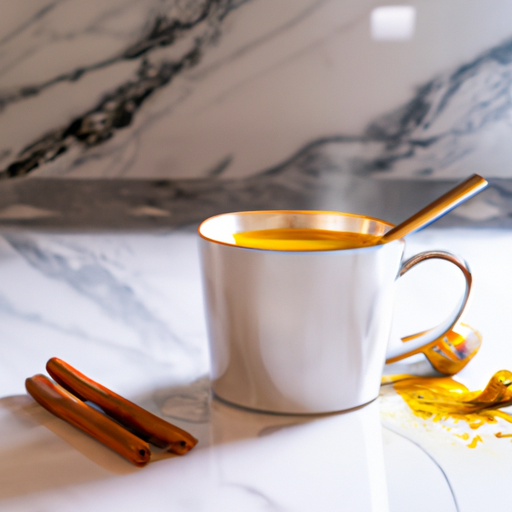Do you enjoy a hot cup of tea in the morning or before going to bed? Are you familiar with the possible advantages of incorporating turmeric into your tea? Turmeric, a spice frequently utilized in Indian cooking and alternative medicine, has become increasingly popular for its potential health benefits in recent years.
In this article, we will explore the question, ‘Is turmeric good in tea?’by examining the evidence-based benefits and drawbacks, providing a turmeric tea recipe, and discussing precautions when consuming turmeric tea.
Turmeric contains a compound called curcumin, which has anti-inflammatory and antioxidant properties. Studies have shown that curcumin may have potential benefits for a range of health conditions, including arthritis, heart disease, and certain types of cancer. Additionally, turmeric has been used in traditional medicine to aid digestion and improve liver function.
With these potential benefits in mind, it’s no wonder that turmeric has become a popular addition to tea. However, it’s important to examine both the benefits and drawbacks before incorporating turmeric into your daily routine.
Key Takeaways
- Turmeric tea offers natural pain relief and immune system boosting properties.
- Turmeric contains curcumin, which has anti-inflammatory and antioxidant properties that can prevent chronic diseases such as heart disease, cancer, and Alzheimer’s disease.
- Turmeric tea can support weight loss efforts by boosting metabolism, reducing inflammation, and curbing cravings.
- Turmeric tea can act as a detox for the body and help eliminate toxins that can cause skin problems, reduce inflammation in the skin, and lead to a clearer complexion.
Benefits of Turmeric
Turmeric’s numerous health benefits make it a popular addition to tea. This bright yellow spice has been used for centuries in traditional medicine to treat a variety of ailments such as arthritis, digestive problems, and skin conditions.
Turmeric contains a compound called curcumin, which has anti-inflammatory and antioxidant properties. These properties make turmeric a powerful immune system booster and a natural pain reliever. Turmeric supplements are also available for those who want to ensure they’re getting a consistent daily dose of this powerful spice.
Turmeric’s culinary uses are also widespread, making it a versatile ingredient in the kitchen. It’s commonly used in Indian and Middle Eastern cuisine, adding a warm, earthy flavor to dishes. Turmeric also gives curry its distinctive yellow color.
Incorporating turmeric into your diet is an easy way to reap the many health benefits this spice offers. However, it’s important to note that there are also some potential drawbacks to consuming turmeric, which we’ll discuss in the next section.
Drawbacks of Turmeric
You might be surprised to learn that excessive consumption of the popular spice in your daily cuppa can have some negative effects on your health. While turmeric has numerous health benefits, it also has potential side effects that you should be aware of. The key is to find the right turmeric dosage and not overdo it.
A study published in the Journal of Medicinal Food found that high doses of turmeric can cause gastrointestinal problems, such as nausea and diarrhea. Additionally, turmeric can interact with certain medications, including blood thinners and diabetes drugs. It’s important to speak with your healthcare provider before incorporating turmeric into your diet, especially if you have a medical condition or are taking medication. Remember, moderation is key when it comes to consuming turmeric.
Now that you know the potential drawbacks of turmeric, let’s move on to the next section where you can learn how to make a delicious and healthy turmeric tea recipe.
Turmeric Tea Recipe
Get ready to indulge in a tasty cup of golden goodness with this easy-to-make recipe for a healthy tea packed with antioxidants and anti-inflammatory properties. Turmeric tea, also known as turmeric latte or turmeric ginger tea, is a delicious and healthy way to incorporate this powerful spice into your daily routine. Here’s how to make it:
- Boil 2 cups of water in a small pot.
- Add 1 tablespoon of grated fresh turmeric root or 1 teaspoon of ground turmeric.
- Add 1 teaspoon of grated fresh ginger root or ½ teaspoon of ground ginger.
- Reduce heat and let simmer for 5-10 minutes.
- Strain the tea into a mug and add honey or lemon to taste.
This simple recipe is a great way to enjoy the many health benefits of turmeric, including its anti-inflammatory and antioxidant properties. Plus, the warm and comforting flavor of turmeric and ginger makes it the perfect drink for a cozy night in or a soothing afternoon pick-me-up.
So go ahead and give it a try! As you sip on your delicious turmeric tea, you’ll be happy to know that this powerful spice has been linked to a number of health benefits. From reducing inflammation and improving brain function to preventing cancer and heart disease, turmeric is a true superfood.
In the next section, we’ll explore some of the many health benefits of turmeric tea in more detail.
Health Benefits of Turmeric Tea
If you’re looking for a natural way to reduce inflammation, improve brain function, and lower your risk of chronic diseases, turmeric tea may be just what you need. Studies have shown that the active ingredient in turmeric, curcumin, has anti-inflammatory and antioxidant properties that can help reduce inflammation in the body.
Additionally, curcumin has been shown to improve cognitive function and reduce the risk of chronic conditions such as heart disease and cancer. So, if you want to reap the health benefits of turmeric, consider adding it to your daily routine in the form of a warm and delicious cup of tea.
Reduced Inflammation
When sipping on a warm cup of turmeric tea, you may notice a subtle reduction in inflammation throughout your body, thanks to the powerful anti-inflammatory properties of this golden spice. Here are four ways that turmeric tea can help reduce inflammation and improve pain management:
-
Turmeric contains curcumin, a powerful antioxidant that helps reduce inflammation in the body.
-
Studies have shown that curcumin can be as effective as some anti-inflammatory drugs, but without the negative side effects.
-
Turmeric has been shown to reduce inflammation in conditions such as arthritis, inflammatory bowel disease, and even certain types of cancer.
-
Drinking turmeric tea regularly may help reduce chronic inflammation and improve overall health.
Reducing inflammation is just one of the many benefits of turmeric tea. In the next section, we’ll explore how this spice can also improve brain function.
Improved Brain Function
Boost your cognitive abilities and mental clarity by incorporating turmeric into your daily routine. This spice has been found to improve brain function, particularly in terms of concentration and memory retention. The active ingredient in turmeric, curcumin, has been shown to increase levels of brain-derived neurotrophic factor (BDNF), a protein that plays a role in the growth and survival of neurons.
To further emphasize the benefits of turmeric on brain function, take a look at the table below:
| Benefit | Evidence |
|---|---|
| Improved concentration | A study published in the Journal of Psychopharmacology found that taking curcumin supplements improved attention and working memory in healthy older adults. |
| Memory retention | Another study published in the same journal found that curcumin supplements improved memory and mood in people with age-related memory decline. |
Incorporating turmeric into your daily routine can not only improve your brain function but also lower your risk of chronic diseases.
Lowered Risk of Chronic Diseases
Lowering the risk of chronic diseases is one of the key benefits of regularly incorporating turmeric into your diet. Turmeric contains curcumin, a powerful anti-inflammatory compound that has been shown to reduce inflammation in the body and prevent chronic diseases such as heart disease, cancer, and Alzheimer’s disease. However, it’s important to note that turmeric should not be relied upon as a cure-all or a replacement for medical treatment.
Dietary sources of turmeric include fresh or powdered turmeric root, which can be added to dishes such as curries, soups, and stir-fries. The recommended dosage of turmeric varies depending on the form in which it is consumed, but a general guideline is 1-2 teaspoons of turmeric powder per day. If you’re interested in incorporating turmeric into your diet for its potential health benefits, it’s always a good idea to talk to your healthcare provider first.
To make turmeric tea taste better, there are a few simple steps you can take to enhance its flavor. Add a sweetener such as honey or maple syrup, or a splash of milk or coconut milk to the tea. You can also experiment with adding other spices such as ginger, cinnamon, or cardamom to create a more complex and flavorful tea.
How to Make Turmeric Tea Taste Better
Adding a splash of honey and a squeeze of lemon to your turmeric tea can take the taste from earthy to refreshing in just seconds. Turmeric tea is known for its many health benefits, but the taste can be an acquired one.
Luckily, there are many turmeric tea pairing options that can make this drink more enjoyable. Some variations include adding ginger, cinnamon, or even coconut milk to the tea. Incorporating these flavors can make a huge difference in the taste of your turmeric tea.
Not only will it make the drink more palatable, but it will also add additional health benefits. However, it’s important to note that while turmeric tea can be a great addition to your diet, it shouldn’t be used as a replacement for turmeric supplements.
Turmeric Tea vs. Turmeric Supplements
If you’re looking to increase your daily intake of curcumin, taking a turmeric supplement may be a more convenient option than incorporating turmeric into your tea routine. Turmeric supplements are available in a variety of forms, including capsules, powders, and tinctures. They offer a concentrated dose of curcumin, the active ingredient in turmeric, which has been shown to have anti-inflammatory and antioxidant properties. However, it’s important to note that the effectiveness of turmeric supplements can vary depending on the brand and formulation, so it’s important to do your research before purchasing.
On the other hand, turmeric tea varieties offer a more natural way to consume curcumin, as well as other beneficial compounds found in turmeric. Some popular turmeric tea varieties include golden milk, chai tea, and ginger turmeric tea. While turmeric tea may not offer the same concentrated dose of curcumin as supplements, it can still provide a range of health benefits when consumed regularly. However, it’s important to note that turmeric tea may interact with certain medications and should be consumed in moderation. With that in mind, let’s explore some precautions to take when drinking turmeric tea.
Precautions When Drinking Turmeric Tea
Before you start consuming turmeric tea, it’s crucial to be aware of some precautions to ensure that you don’t experience any adverse effects on your health. While turmeric is generally safe for most people, excessive consumption may cause gastrointestinal problems such as stomach upset, diarrhea, and nausea. Therefore, it’s essential to consume turmeric tea in moderation and not exceed the recommended dosage.
To prepare a cup of turmeric tea, it’s recommended to use a quarter to half a teaspoon of ground turmeric per cup of water. However, some people prefer to use more turmeric for a stronger taste. If you’re new to turmeric tea, start with a smaller amount and gradually increase the dosage.
Additionally, if you’re taking any medication or have a medical condition, it’s best to consult with a healthcare professional before consuming turmeric tea to avoid any potential interactions.
As you move on to the subsequent section about ‘turmeric tea for weight loss,’ keep in mind that drinking turmeric tea alone won’t lead to significant weight loss. However, incorporating it into a healthy diet and exercise routine may help support weight loss efforts.
Turmeric Tea for Weight Loss
One way to support weight loss is by incorporating a warm and flavorful beverage into your daily routine. Turmeric tea, in particular, has been shown to offer numerous benefits for those looking to shed some pounds.
Here are three reasons why you should consider adding turmeric tea to your weight loss regimen:
-
Boosts metabolism: Turmeric contains a compound called curcumin, which has been shown to increase metabolism and help burn calories more efficiently.
-
Reduces inflammation: Inflammation is often linked to weight gain, and turmeric’s anti-inflammatory properties can help reduce this risk factor.
-
Curbs cravings: Turmeric tea has a natural sweetness and warmth that can help satisfy cravings for sugary or high-calorie foods.
When brewing turmeric tea for weight loss, it’s important to use high-quality turmeric powder and to allow the tea to steep for at least 10 minutes to fully release its beneficial compounds. Consider adding a dash of black pepper to increase absorption of curcumin.
With these tips in mind, you can enjoy the delicious and healthful benefits of turmeric tea as part of your weight loss journey.
As you continue to explore the benefits of turmeric tea, you may also be interested in learning how it can support your skin health.
Turmeric Tea for Skin Health
Adding a warm and flavorful beverage to your daily routine can benefit your skin health. For example, a delicious cup of turmeric tea with its anti-inflammatory properties can be a great addition.
Turmeric tea has been known to act as a detox for the body, helping to eliminate toxins that can cause skin problems. It can also help reduce inflammation in the skin, which can lead to a clearer complexion.
Moreover, turmeric tea can be used as a natural remedy for acne. The anti-inflammatory properties of turmeric can help reduce redness and swelling associated with acne. It also has antibacterial properties that can help eliminate bacteria that can cause acne breakouts.
By incorporating turmeric tea into your daily routine, you may see an improvement in the overall health and appearance of your skin.
Frequently Asked Questions
Can turmeric tea be consumed during pregnancy?
When pregnant, it’s important to be cautious with herbal teas, including turmeric tea. While turmeric tea may offer benefits for postpartum recovery, more research is needed to determine its safety during pregnancy.
How much turmeric tea should I drink in a day?
Oh sure, go ahead and drink as much turmeric tea as you want. Just kidding! While turmeric tea benefits are numerous, moderation is key. Aim for 1-2 cups a day and follow proper brewing tips for maximum health benefits.
Can turmeric tea interact with certain medications?
Before taking turmeric tea, it’s important to be aware of possible interactions with certain medications. Consult with your doctor and take necessary precautions to avoid any adverse effects.
What is the best time of day to drink turmeric tea?
To maximize the health benefits of turmeric tea, it’s best to drink it in the morning on an empty stomach. Adding honey or lemon can enhance the taste and increase absorption. However, consult with a healthcare provider before consuming if taking certain medications.
How long does it take to see the health benefits of turmeric tea?
You may start noticing the health benefits of turmeric tea after a few weeks of consistent consumption. To maximize its effects, use potent turmeric tea recipes and brewing methods. Compared to other anti-inflammatory beverages, turmeric tea stands out for its potent antioxidant and anti-inflammatory properties.
Conclusion
Congratulations, you’ve learned all about the benefits and drawbacks of turmeric and its effectiveness in tea form. Turmeric has been shown to have numerous health benefits, including reducing inflammation, improving brain function, and potentially even preventing cancer. However, there are also some potential drawbacks to consuming turmeric, such as interactions with certain medications and the risk of stomach issues.
If you’re interested in incorporating turmeric into your diet, try making some turmeric tea using the recipe provided. Not only does it offer the same health benefits as turmeric supplements, but it can also be a delicious and comforting beverage. If you find the taste of turmeric to be too strong, experiment with adding other ingredients to balance it out.
Overall, while turmeric tea may not be a miracle cure, it can certainly be a valuable addition to a healthy diet. So go ahead and give it a try, and who knows, the benefits may surprise you. As the saying goes, "a cup of turmeric tea a day keeps the doctor away"… or at least keeps your body healthy and happy in the long run.










